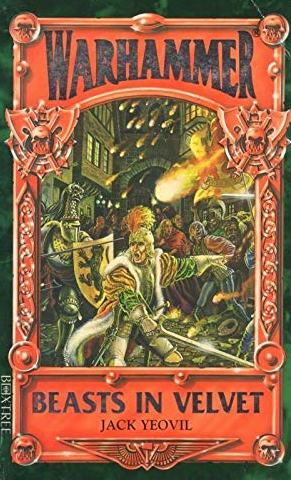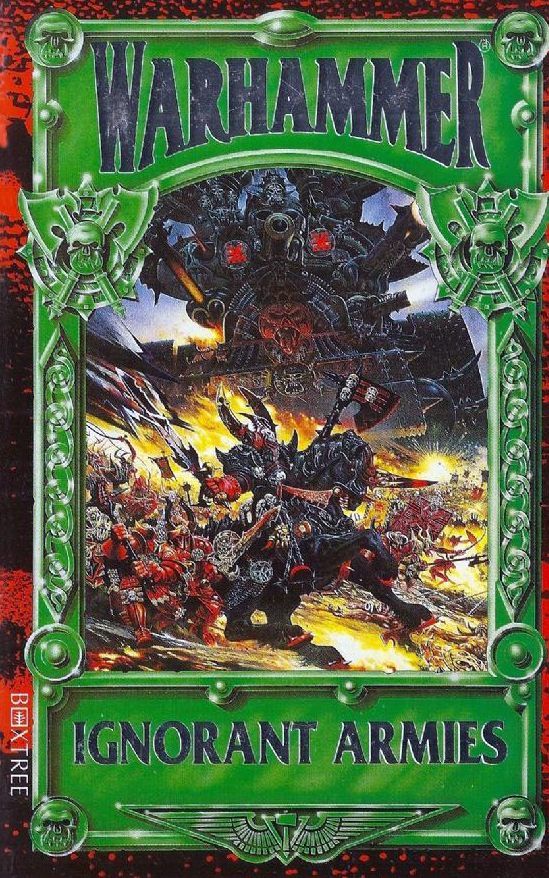In my post on What is Warhammer Fantasy Roleplay I talked at some length about what it is that makes WFRP identifiably WFRP to me1. Over the past few months I have been re-reading some of my old Warhammer fiction – books like Drachenfels, Beasts in Velvet, the Konrad trilogy and the short story anthologies Ignorant Armies, Wolf Riders and Red Thirst. Revisiting some of these books has led me to the realisation that they contributed to my conception of the Warhammer world and WFRP just as much as the First Edition rulebook and the original Enemy Within campaign.
In some ways they are standard dark fantasy stories. None are going to win prizes for Great Literature. Heroes are usually young and male (with one major exception on both counts!2). There’s usually some bloody action, often a bit of titillation but never anything really graphic. I’m certain that the intended readership is teenage boys. I’m certainly not a great expert on fantasy literature, so I can’t compare these novels to a huge range of other material, but to me they stand apart from the other fantasy novels I read at the time for being a bit darker and having a bit more of a social conscience.
One major thing I notice is that mutants are often treated with sympathy. This is in stark contrast to the classic WFRP adventures (especially the Enemy Within), in which they are generally presented as monsters to be put to the sword, their minds corrupted just as surely as their bodies. In these novels – particularly those written by Jack Yeovil (a pen-name for Kim Newman) – mutants are just as likely to be good people, horrified at the changes they are undergoing and desperately hiding them from even their closest friends. Indeed, in Yeovil’s stories, the principle villains are likely to be nobles, physically uncorrupted but secretly descended into evil. There is a very clear sense of social inequality – that in this society, the rich and powerful probably don’t have your best interests at heart (though, to be fair, there are good examples among them).


Main characters are likely to be rather greyer than in some standard fantasy of the time. Many protagonists in short stories meddle in dark forces and receive their comeuppance (often at the expense of other innocent lives) – morality tales in the Warhammer world. Characters are also very human (literally so, since non-human protagonists are vanishingly rare – once again Genevieve being a notable exception!) with doubts and fears. Some are warriors, but our point of view character is just as likely to be a playwright, a gardener or a farmboy. None are really larger than life – even the legendary Gotrek, who is admittedly a badass warrior (and never the point of view character) loses an eye to a humble goblin in one of these stories!
There’s also lots of worldbuilding going on, much of it beyond the bounds of the Empire. One short story contains a fabulous description of Parravon with some truly excellent Chaos corruption going on. Gotrek and Felix adventure in the Border Princes. Johann von Mecklenberg ventures into the honest-to-goodness Chaos Wastes in pursuit of the Champion of Chaos who has kidnapped his brother.
It’s an interesting mix. I’m not going to claim these stories are great literature, and my opinion of them is inevitably heavily clouded by nostalgia. I’ve not delved into the Warhammer fiction of the Black Library (and nor do I particularly want to) so I can’t say how later Warhammer novels compare – though the impression I get is that they are much more focused on Big Characters and Epic Action, neither of which really interests me. (Perhaps I’m being unfair and judging the books by their covers!)

One very accessible way to enjoy (or at least listen to…) many of these early stories is the Oldhammer Fiction Podcast by Lewis Davies, which contains full readings of stories and commentary on them. Highly recommended! https://podcasts.apple.com/gb/podcast/the-oldhammer-fiction-podcast/id1637056733
LikeLiked by 1 person
Thanks for the recommendation! I’ll have a listen when I can make the time.
LikeLiked by 1 person
Another great way is the audiobooks Jonathan Keeble does a excellent job.
LikeLiked by 1 person
I am currently on my first read through of Wolf Riders. This is the Warhammer fiction I started with and have been missing for several years now! This old stuff is great. My greatest influence is from the WFRP book itself, but these stories are what I want to expand my tabletop games into. Great timing on the post.
LikeLiked by 1 person
Thanks! Wolf Riders isn’t my favourite of the anthologies, but it’s still a good collection – and No Gold in the Grey Mountains is absolutely fantastic.
LikeLike
Any tips on where to start with WH fiction if I like the grounded feel of first edition? Any time I’ve tried reading random Warhammer books in the past, they turned out to be quite epic and hack-and-slashy (granted, it’s a long time ago and I didn’t know how to select).
Recently, I gave it a new chance and bought… Felix and Gotrek. And while it is a fun read, it’s not what I imagine as WFRP.
LikeLiked by 1 person
Drachenfels is excellent and not at all hack-and-slashy; its mostly a horror-light story about the staging of a historical play in an unwise location. If you like that, then Beasts in Velvet is also fantastic.
Ignorant Armies (anthology) has some hack and slash stuff in it, but a lot of it is not like that. It includes the very first Gotrek & Felix story (which I think *is* in the style of early WFRP – perhaps unlike later G&F stuff), along with some great little stories, some of which are very much in the spirit of the “anything goes” style of early WFRP.
LikeLike
Oh yeah, the first Felix & Gotrek story (the one with the carriage in the woods, right?) is excellent, and got me to buy the whole book after I read it as the free excerpt. 🙂 (The rest of the book is fine too, just different style.)
Thanks for the tips!
LikeLiked by 1 person
Drachenfels would be my go to recommendation for anyone interested in reading GW fiction from any era.
Beasts in Velvet also by Kim Newman/Jack Yeovil feels even more WFRP in tone and content.
I’d strongly recommend some of Brian Craig’s books too (also a pseudonym, this time for Brian Stableford). In particular, Zaragoz is great. Plague Demon less so and Storm Warriors the weakest of the three. His later Black Library Wine of Dreams is also good but does feel as though the editor asked him to put in a battle at end and result feels bolted on to an otherwise low key atmospheric piece.
Of the early collections, I agree Ignorant Armies is best. How many of today’s BL fiction books quote Matthew Arnold in their titles?
On the subject of Felix and Gotrek, I have a real fondness for the early stories, especially Wolf Riders and The Dark Beneath the World. The one that is most WRFP though is Skaven’s Claw. It is now the first story in the Skavneslayer collection but it’s first outing was as a single story in White Dwarf.
LikeLiked by 2 people
I must read Skavenskayer sometime! And I’ve got hold of Zaragoz to read soon.
Agree that Beasts in Velvet is very WFRP-y.
LikeLike
Again, if you can stand listening to audio stories and want a sampling of the early short fiction, the Oldhammer Fiction Podcast is a great start. He does have a reading of the whole of Drachenfels and Zaragoz as well.
LikeLiked by 1 person
I listened to the first episode (on The Reavers and the Dead) and found it a great listen. Even if you don’t care to listen to the whole story, he has a nice bit of analysis at the end.
Thanks for recommending it!
LikeLiked by 1 person
To be honest, I am not so much of a fan of the rest of Skavenslayer: it begins to feel a bit repetitious with one Skaven plot after another to be foiled.
LikeLiked by 1 person
Pingback: Review: Altdorf – Crown of the Empire (part 1) – Ill Met by Morrslieb